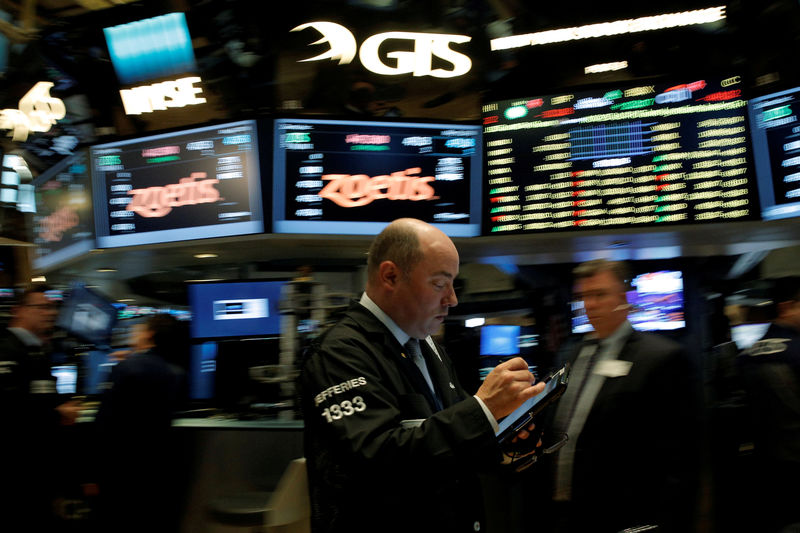By Claire Milhench
LONDON (Reuters) - Global investors have raised their holdings of cash and bonds, citing fears about potential shock waves from a Brexit vote rippling beyond Britain and the increased likelihood of a rise in U.S. interest rates this summer.
Fund managers polled by Reuters in the United States, Europe, Britain and Japan raised cash allocations to 6 percent in May, the highest level since January when global equity markets were in free-fall. They also increased their bond exposure to 37.8 percent from 37.6 percent in April.
The monthly poll showed that investors trimmed their equity allocation to 46.4 percent, citing worries about Britain's June 23 referendum on membership of the European Union, and the growing expectation that the U.S. Federal Reserve would raise interest rates in June or July.
"Over the short term, the greatest risk is a Brexit," said Nadege Dufosse, head of asset allocation at Candriam, arguing that while the strongest impact would be on euro zone and UK equities, a global "risk off" move was also likely.
"Brexit risk is at the top of our geopolitical concerns and we believe it may have a material impact on European risk assets," agreed Giordano Lombardo, group chief investment officer and chief executive of Pioneer Investments.
"We prefer to keep a cautious stance."
The survey of 58 fund managers and chief investment officers was conducted between May 16 and May 25.
During this period, online and telephone polls of UK voter intentions for the upcoming referendum on EU membership have given differing accounts of support for the 'Leave' and 'Remain' camps. This has clouded the view for investors, especially with a significant number of voters seemingly still undecided.
In the Reuters asset allocation poll, 20 out of 22 respondents who expressed a view thought that a victory for the 'Leave' camp would have repercussions beyond UK markets, hammering European stocks and the euro.
Several respondents worried that a vote to leave could set a bad precedent, bolstering anti-EU forces across the continent.
"Both European equities and the euro will face a major structural challenge that will undermine the foundations of the integration process in Europe," said asset allocators at Unigestion.
Although some managers thought that downside risks were already factored in, others, such as Peter Lowman, chief investment officer at UK-based wealth manager Investment Quorum, reckon financial markets are still underplaying Brexit risks.
"Short term, an exit is likely to affect global market sentiment," he said, adding this could explain the reduction in equity exposure of the last few weeks.
HAWKISH FED?
Investors are also cautious as the U.S. Federal Reserve is expected to raise interest rates this summer following more hawkish comments from Fed policymakers in recent days, and an improvement in U.S. economic data.
As recently as early May, a Fed rate hike in June seemed off the agenda, but that probability now stands around 26 percent, according to the CME Group's FedWatch calculator, while market participants see a 50-50 chance of a July move.
As the Reuters poll was carried out during the period when Fed policymakers were signaling a more hawkish stance, it is perhaps not surprising that 87 percent of respondents who expressed a view expected the Fed to raise rates in 2016 after standing pat since December.
"We expect a June or July rate hike with another toward the end of the year," said Trevor Greetham, head of multi-asset at Royal London Asset Management.
"The U.S. economy is picking up again according to business surveys, the unemployment rate is low and inflation is likely to rise in the second half of the year on oil price base effects."
Some investors expressed fears that Yellen may have to tighten policy more quickly than expected if U.S inflation begins to pick up in earnest.
ON EDGE
Within global equity portfolios, investors raised U.S. equity exposure to 39 percent, the highest since November 2015, and held UK equities steady at 11.1 percent.
They cut Japanese stock holdings by 2.7 percentage points to 18.1 percent, the lowest since November 2015, whilst slightly raising euro zone equities to 18.8 percent.
However, fund managers said it was difficult to get too bullish given sluggish economies and volatile politics in emerging and developed markets.
"We have a backdrop of rather modest corporate profitability, and valuations in some sectors or markets which appear quite fully valued," said Mark Robinson, chief investment officer at wealth manager Bordier & Cie (UK). "It is therefore not surprising to see markets on edge."
Developed stocks have had a decent run since the February trough, and in May the S&P 500 (SPX) is up around one percent and European equities (FTEU3) have risen almost two percent. But emerging markets (MSCIEF) are faltering, having shed more than 3 percent in May.
"We don't see many catalysts for further sustained rallies of risk assets in this phase," said Pioneer's Lombardo. "Global economic growth is decent, but not impressive, and fiscal policy, which could be a positive catalyst, is still too timid."

(This story fixes attribution of quote in paragraph eleven)